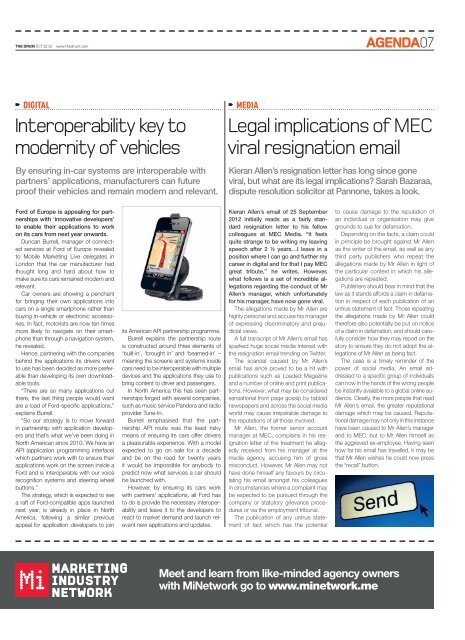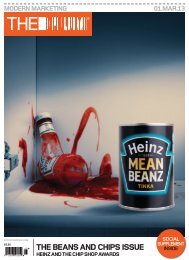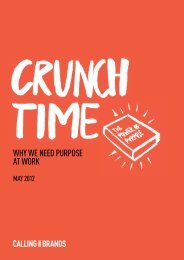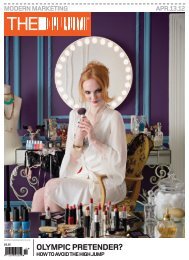GET SET TO BE STUNNED - The Drum
GET SET TO BE STUNNED - The Drum
GET SET TO BE STUNNED - The Drum
Create successful ePaper yourself
Turn your PDF publications into a flip-book with our unique Google optimized e-Paper software.
THE DRUM OCT.12.12 www.thedrum.com AGENDA07<br />
digital<br />
Interoperability key to<br />
modernity of vehicles<br />
By ensuring in-car systems are interoperable with<br />
partners’ applications, manufacturers can future<br />
proof their vehicles and remain modern and relevant.<br />
media<br />
Legal implications of MEC<br />
viral resignation email<br />
Kieran Allen’s resignation letter has long since gone<br />
viral, but what are its legal implications Sarah Bazaraa,<br />
dispute resolution solicitor at Pannone, takes a look.<br />
Ford of Europe is appealing for partnerships<br />
with ‘innovative developers’<br />
to enable their applications to work<br />
on its cars from next year onwards.<br />
Duncan Burrell, manager of connected<br />
services at Ford of Europe revealed<br />
to Mobile Marketing Live delegates in<br />
London that the car manufacturer had<br />
thought long and hard about how to<br />
make sure its cars remained modern and<br />
relevant.<br />
Car owners are showing a penchant<br />
for bringing their own applications into<br />
cars on a single smartphone rather than<br />
buying in-vehicle or electronic accessories.<br />
In fact, motorists are now ten times<br />
more likely to navigate on their smartphone<br />
than through a navigation system,<br />
he revealed.<br />
Hence, partnering with the companies<br />
behind the applications its drivers want<br />
to use has been decided as more preferable<br />
than developing its own downloadable<br />
tools.<br />
“<strong>The</strong>re are so many applications out<br />
there, the last thing people would want<br />
are a load of Ford-specific applications,”<br />
explains Burrell.<br />
“So our strategy is to move forward<br />
in partnership with application developers<br />
and that’s what we’ve been doing in<br />
North American since 2010. We have an<br />
API (application programming interface)<br />
which partners work with to ensure their<br />
applications work on the screen inside a<br />
Ford and is interoperable with our voice<br />
recognition systems and steering wheel<br />
buttons.”<br />
<strong>The</strong> strategy, which is expected to see<br />
a raft of Ford-compatible apps launched<br />
next year, is already in place in North<br />
America, following a similar previous<br />
appeal for application developers to join<br />
its American API partnership programme.<br />
Burrell explains the partnership route<br />
is constructed around three elements of<br />
‘built-in’, ‘brought in’ and ‘beamed-in’ –<br />
meaning the screens and systems inside<br />
cars need to be interoperable with multiple<br />
devices and the applications they use to<br />
bring content to driver and passengers.<br />
In North America this has seen partnerships<br />
forged with several companies,<br />
such as music service Pandora and radio<br />
provider Tune-In.<br />
Burrell emphasised that the partnership<br />
API route was the least risky<br />
means of ensuring its cars offer drivers<br />
a pleasurable experience. With a model<br />
expected to go on sale for a decade<br />
and be on the road for twenty years<br />
it would be impossible for anybody to<br />
predict now what services a car should<br />
be launched with.<br />
However, by ensuring its cars work<br />
with partners’ applications, all Ford has<br />
to do is provide the necessary interoperability<br />
and leave it to the developers to<br />
react to market demand and launch relevant<br />
new applications and updates.<br />
Kieran Allen’s email of 25 September<br />
2012 initially reads as a fairly standard<br />
resignation letter to his fellow<br />
colleagues at MEC Media. “It feels<br />
quite strange to be writing my leaving<br />
speech after 2 ½ years…I leave in a<br />
position where I can go and further my<br />
career in digital and for that I pay MEC<br />
great tribute,” he writes. However,<br />
what follows is a set of incredible allegations<br />
regarding the conduct of Mr<br />
Allen’s manager, which unfortunately<br />
for his manager, have now gone viral.<br />
<strong>The</strong> allegations made by Mr Allen are<br />
highly personal and accuse his manager<br />
of expressing discriminatory and prejudicial<br />
views.<br />
A full transcript of Mr Allen’s email has<br />
sparked huge social media interest with<br />
the resignation email trending on Twitter.<br />
<strong>The</strong> scandal caused by Mr Allen’s<br />
email has since proved to be a hit with<br />
publications such as Loaded Magazine<br />
and a number of online and print publications.<br />
However, what may be considered<br />
sensational front page gossip by tabloid<br />
newspapers and across the social media<br />
world may cause irreparable damage to<br />
the reputations of all those involved.<br />
Mr Allen, the former senior account<br />
manager at MEC, complains in his resignation<br />
letter of the treatment he allegedly<br />
received from his manager at the<br />
media agency, accusing him of gross<br />
misconduct. However, Mr Allen may not<br />
have done himself any favours by circulating<br />
his email amongst his colleagues<br />
in circumstances where a complaint may<br />
be expected to be pursued through the<br />
company or statutory grievance procedures<br />
or via the employment tribunal.<br />
<strong>The</strong> publication of any untrue statement<br />
of fact which has the potential<br />
to cause damage to the reputation of<br />
an individual or organisation may give<br />
grounds to sue for defamation.<br />
Depending on the facts, a claim could<br />
in principle be brought against Mr Allen<br />
as the writer of the email, as well as any<br />
third party publishers who repeat the<br />
allegations made by Mr Allen in light of<br />
the particular context in which his allegations<br />
are repeated.<br />
Publishers should bear in mind that the<br />
law as it stands affords a claim in defamation<br />
in respect of each publication of an<br />
untrue statement of fact. Those repeating<br />
the allegations made by Mr Allen could<br />
therefore also potentially be put on notice<br />
of a claim in defamation, and should carefully<br />
consider how they may report on the<br />
story to ensure they do not adopt the allegations<br />
of Mr Allen as being fact.<br />
<strong>The</strong> case is a timely reminder of the<br />
power of social media. An email addressed<br />
to a specific group of individuals<br />
can now in the hands of the wrong people<br />
be instantly available to a global online audience.<br />
Clearly, the more people that read<br />
Mr Allen’s email, the greater reputational<br />
damage which may be caused. Reputational<br />
damage may not only in this instance<br />
have been caused to Mr Allen’s manager<br />
and to MEC, but to Mr Allen himself as<br />
the aggrieved ex-employee. Having seen<br />
how far his email has travelled, it may be<br />
that Mr Allen wishes he could now press<br />
the “recall” button.<br />
Meet and learn from like-minded agency owners<br />
with MiNetwork go to www.minetwork.me









